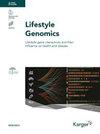Precision Nutrition for Cardiovascular Diseases Prevention
IF 1.4
4区 医学
Q3 GENETICS & HEREDITY
引用次数: 1
Abstract
Background: Cardiovascular diseases (CVD) are the leading cause of death globally, making their prevention a major challenge for modern society. For decades, treatments aimed at reducing CVD risk factors through nutritional recommendations and medications have had variable success. One of the main reasons behind this is the interindividual variability in response to drugs and nutritional interventions. The development of genomics has allowed the discovery of genetic variants influencing drug and food response, leading to more personalized treatments in the form of precision medicine and precision nutrition. The latter is based on the principle that one diet does not fit all and the need to stratify individuals into subgroups based on their response to nutrients. Despite showing great promise in pushing forward the field of nutrition, health professionals have very little knowledge of precision nutrition, even though the general population is showing interest in more personalized nutritional guidance. Summary: This review aims to provide an overview of key sources of interindividual variability observed in CVD risk factors in response to nutritional interventions. Despite some limitations, genetic testing is a mature predictive tool that should be at the forefront of tailored nutrition recommendations for CVD prevention. Although the epigenome-diet relationship shows great promise, it is still too early in its development to allow for its clinical deployment. Metabolomics has the potential to enhance genetic testing by complementing traditional self-reported dietary intake instruments as well as a very promising metabotyping method. Microbiome phenotyping, despite its complexity, provides a wealth of information on the health status of the host and its response to nutrients. Finally, current applications are discussed and an outline of the required steps for a successful implementation of precision nutrition in clinical practice as a tool for CVD prevention is presented. Key Messages: Precision nutrition is the cornerstone of a promising approach offering targeted nutritional recommendations for CVD prevention.精准营养预防心血管疾病
背景:心血管疾病(CVD)是全球死亡的主要原因,使其预防成为现代社会的主要挑战。几十年来,通过营养建议和药物治疗来降低心血管疾病风险因素的治疗取得了不同程度的成功。这背后的一个主要原因是个体对药物和营养干预的反应存在差异。基因组学的发展使人们能够发现影响药物和食物反应的基因变异,从而以精准医疗和精准营养的形式实现更个性化的治疗。后者是基于一种饮食不适合所有人的原则,以及需要根据个人对营养的反应将其划分为亚组。尽管在推动营养领域的发展方面显示出巨大的希望,但卫生专业人员对精确营养知之甚少,尽管普通大众对更个性化的营养指导表现出兴趣。摘要:本综述旨在概述在营养干预下观察到的心血管疾病危险因素个体间差异的主要来源。尽管有一些限制,基因检测是一种成熟的预测工具,应该在为心血管疾病预防量身定制的营养建议的最前沿。尽管表观基因组与饮食的关系显示出巨大的希望,但它仍处于发展的早期阶段,无法用于临床应用。代谢组学作为一种非常有前途的代谢分型方法,有潜力通过补充传统的自我报告饮食摄入工具来增强基因检测。微生物组表型,尽管其复杂性,提供了丰富的信息,宿主的健康状况及其对营养物质的反应。最后,讨论了目前的应用,并概述了在临床实践中成功实施精确营养作为心血管疾病预防工具所需的步骤。关键信息:精确营养是为心血管疾病预防提供有针对性的营养建议的有前途的方法的基石。
本文章由计算机程序翻译,如有差异,请以英文原文为准。
求助全文
约1分钟内获得全文
求助全文
来源期刊

Lifestyle Genomics
Agricultural and Biological Sciences-Food Science
CiteScore
4.00
自引率
7.70%
发文量
11
审稿时长
28 weeks
期刊介绍:
Lifestyle Genomics aims to provide a forum for highlighting new advances in the broad area of lifestyle-gene interactions and their influence on health and disease. The journal welcomes novel contributions that investigate how genetics may influence a person’s response to lifestyle factors, such as diet and nutrition, natural health products, physical activity, and sleep, amongst others. Additionally, contributions examining how lifestyle factors influence the expression/abundance of genes, proteins and metabolites in cell and animal models as well as in humans are also of interest. The journal will publish high-quality original research papers, brief research communications, reviews outlining timely advances in the field, and brief research methods pertaining to lifestyle genomics. It will also include a unique section under the heading “Market Place” presenting articles of companies active in the area of lifestyle genomics. Research articles will undergo rigorous scientific as well as statistical/bioinformatic review to ensure excellence.
 求助内容:
求助内容: 应助结果提醒方式:
应助结果提醒方式:


